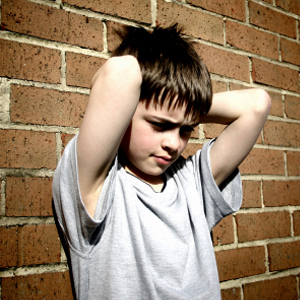
Certain areas in the brains of children with autism overreact to sensory stimuli, such as the touch of a scratchy sweater and loud traffic noises, a new small study shows.
The finding helps to explain why autistic kids are five times more likely than other children to be overwhelmed by everyday sensations like the whir of a fan, hot or cold temperatures, or the tastes and textures of foods.
It's a condition called sensory over-responsivity, and it was recognised as one of the core features of autism spectrum disorder in the latest edition of a respected manual for the diagnosis of psychiatric disorders.
Much stronger reaction
"I think if anybody ever had a doubt that this was just some sort of odd pickiness or something like that in people with autism, this shows, no, there really is a brain basis for this," said Dr Paul Wang, head of medical research for non-profit advocacy group Autism Speaks.
"Their brains are perceiving things differently. It really just shows that this is part of the biology of the condition," said Wang, who was not involved in the research.
For the study, researchers recruited 32 children and teens. Half the group had been diagnosed with autism. The others were typically developing kids who were matched in age to the autistic kids.
The scientists had them rest in a fMRI machine, a kind of scanner than can see brain activity in real time.
Then they touched the kids with a scratchy wool sweater, played loud traffic noises or did both at the same time. Each condition was repeated four times for 15 seconds.
The brains of children with autism reacted much more strongly to the sensory stimulation than did the brains of typically developing kids. The two areas that seemed to be the most hyperactive were the primary sensory cortex, which is responsible for initially processing sensory information, and the amygdala, which is involved in emotional regulation.
More than one stimulus
"To me, that says there are two different things going on here: They are kind of initially interpreting these stimuli differently and, also, they're not able to regulate their response," said study author Shula Green, a PhD candidate in psychology at the University of California at Los Angeles (UCLA).
And there were other differences in how the normal and autistic kids reacted to the same kinds of stimulation.
"In typical kids, they have an initial response almost immediately, then by the second time around, that response goes way down. In kids with autism, that response really stays high throughout the scan. They're not getting used to it [the stimulus]," Green said.
What's more, the hyperactivity the researchers saw on the brain scans became most intense when kids with autism experienced the two sensations at the same time.
"I think something is really going on when there's more than one stimulus the brain has to deal with," Green said. "And that's what real life is, right? There's always more than one [stimulus] at a time."
Keep things simple
Green said her study suggests that parents might avoid meltdowns if they try to keep things simple for autistic children.
"If a kid is having trouble being touched, maybe don't try to touch them in a loud movie theatre. Wait until you're home and it's quiet," she said.
The study is to be presented at the International Meeting for Autism Research in Atlanta.
Read more:
'Sensory integration' may help autistic kids
Girls with autism may need different treatment
MRI to screen for autism




 Publications
Publications
 Partners
Partners














